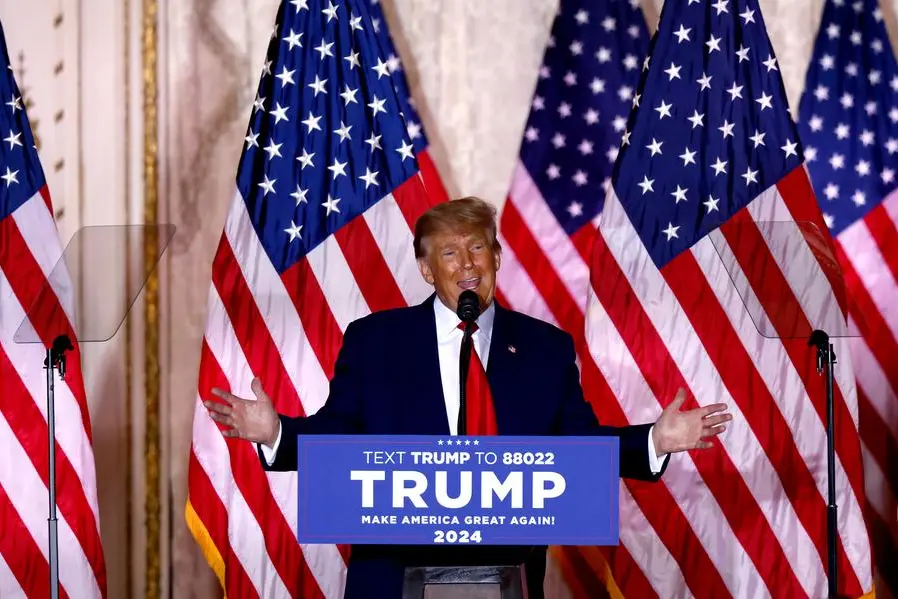PHOTO
Washington, United States: False election fraud claims have not reached the fevered pitch widely expected after US midterm elections, with many conspiracy-peddling supporters of Donald Trump dialing back the rhetoric that observers say hurt Republican candidates.
Think tanks had warned of a prolonged post-election period of chaos and violence, especially after Trump supporters -- who endorsed his "Big Lie" that the 2020 vote was rigged -- seized on isolated poll glitches to make similar evidence-free claims.
But the misinformation drive appeared to lose steam after many of Trump's handpicked candidates got a drubbing at the ballot box, with observers saying their vigorous "election denialism" may have put off voters.
There were nearly 600,000 mentions of voting fraud and similar ideas across Twitter in the week after the November 8 vote, according to Zignal Labs, which studies internet activity.
That marked a significant drop compared to the 2020 election, when Zignal recorded more than 3.5 million such mentions in the same period.
This year, following a "surge" of the fraud narrative on election day when some tabulation machine glitches were reported in the swing state of Arizona, Zignal researchers found that such conversations tapered off 48 hours later.
Trump, who has regularly used his Truth Social platform to drum up support for the false narrative, himself appeared to steer clear of it when he announced Tuesday that he was entering the 2024 White House race.
In his fiery hour-long speech, he tore into his opponent President Joe Biden but barely touched upon fraud, after rumblings within his party that the former president's "Big Lie" rhetoric had hurt them in the midterms.
- 'New direction' -
"Some part of the Republican party believes the embrace of these narratives demoralized the base, reduced turnout, and led to the selection of substandard candidates," Michael Caulfield, a research scientist at the Center for an Informed Public at the University of Washington, told AFP.
"That part of the party needs to talk about the losses, because they want to make a case for a new party direction."
Right-wing supporters and influencers were reeling in shock after the predicted Republican "red wave" did not materialize.
The party failed to wrest control of the Senate and took control of the House of Representatives with only a slim majority, in what was seen as a historically weak midterm performance.
A particular setback was the defeat of multiple Trump-backed candidates for secretary of state -- critical posts that oversee elections -- in battleground states where the former president tried to overturn his 2020 defeat.
"The public made clear with their votes that they did not want election deniers running elections, certainly in swing states where it was a possibility," Pamela Smith, president of the nonpartisan nonprofit Verified Voting, told AFP.
The poor Republican showing has prompted some soul-searching even among far-right politicians in Arizona, where Trump-ally Kari Lake lost her race to be the governor of the state.
"We wonder now if we were in an echo chamber," Republican state senator Wendy Rogers told a right-wing radio host, apparently alluding to her party's messaging to voters.
"I'm just beginning to get some perspective," added Rogers, who sparked an uproar earlier this year when she called for the execution of political enemies.
- 'Winning strategy' -
Kate Starbird, a disinformation researcher and assistant professor at the University of Washington, said it was "heartening" to see some right-wing influencers countering or shying away from unfounded voter fraud claims.
"They may be sensing that it isn't a winning political strategy," said Starbird.
But analysts cautioned that the impact of election denialism has not waned -- and it could gather new momentum ahead of the 2024 presidential election.
On Thursday, Arizona's Lake struck a defiant note after her defeat, posting a video on Twitter in which she railed against what she called the "broken election system" and "problems with tabulating machines" without offering evidence.
During the midterms, analysts say Trump's election falsehoods did not get the expected traction in part because he remains banned on Twitter and Facebook.
That cut off his ability to reach the more than 100 million followers he once had, including major right-wing influencers.
His following on his own social network Truth Social is significantly smaller –- 4.5 million –- and while screenshots of his posts are often shared on other platforms, analysts say his reach is comparatively limited.
But even though the volumes of falsehoods ebbed, they did not disappear.
"The underlying (conspiracy) engine is still churning away, and if influencers decide to engage with it, we are instantly back where we started," said Caulfield.
"Right now, many have decided the long term harm of engaging with the conspiracy engine isn't worth the benefit. As Trump inserts himself into 2024, we'll see if that holds."
© Agence France-Presse





















